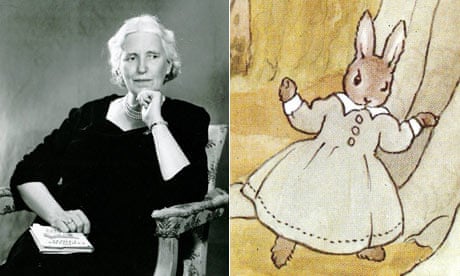She created the enduringly charming children's characters Little Grey Rabbit and Fuzzypeg the Hedgehog but the private diaries of Alison Uttley reveal the author to have been a controlling, difficult woman who despised many people, including her near neighbour Enid Blyton whom she called a "vulgar, curled woman".
Uttley, who grew up in rural Derbyshire, moved to Blyton's home town of Beaconsfield in Buckinghamshire as an adult. Bitterly jealous of Blyton's success, despite being the author of more than 100 books herself, Uttley wrote in her diaries of their one and only meeting: "'I was watching a woman ogling [the fishmonger], her false teeth, her red lips, her head on one side as she gazed up close – suddenly he turned to me and introduced her, Enid Blyton! The Blyton photographed and boastful!" she wrote. "When I asked her which books she wrote, she replied 'Look in Smith's window' and turned away, and never spoke again.'"
She hated comparisons with Beatrix Potter, whom she felt was an illustrator who wrote words around pictures, whereas she herself was a great storyteller; her gravestone reads "a spinner of tales". She also loathed her illustrator Margaret Tempest, calling her "absolutely awful". "She is a humourless bore, seldom does a smile come, her eyes cold and hard," Uttley wrote.
The diaries, which were edited down from 39 volumes by Uttley's biographer, Professor Denis Judd, are published this month by Pen and Sword, spanning the years between 1932 and 1971. They show the reality of the author who, despite becoming the second woman ever to graduate from Manchester University – and in physics – believed in fairies all her life. "It's an amazing paradox," said Judd. "She believed in fairies and in time travel – that people can move in between different worlds. She was both a completely practical, scientific person, and would also talk about ghosts."
"I lay awake thinking of scientific work, the urge and thrill of it. The bliss when we calculated the number of atoms in space … yet I might have found it sterile and my life is human now," Uttley wrote.
She also struggled with a difficult personal life – her husband James committed suicide in 1930, forcing her into her writing career to support her only child John. "I do find life difficult at times … and I behave childishly too, do foolish things, unworthy … I don't think one can have great imagination and great wisdom. Can one?" she mused.
Her books, from her semi-autobiographical account of her childhood on Castle Top Farm in Derbyshire, A Country Child, to the time-slip story for older children A Traveller in Time, and her stories of Little Grey Rabbit, Brock the Badger, Sam Pig and Tim Rabbit, are full of her love for the countryside, and capture it in exquisite detail. Children loved her characters, she felt, because she believed in them. "Mine aren't made up. They are real … I don't sit down to write a story, they come," she wrote.
She might have dismissed "the Blyton" but she admired Walter de la Mare – a fellow believer in time travel, said Judd – writing of him that "he was smiling and very charming, so that I quite loved him".
Uttley died aged 91 in 1976. Her beloved son John killed himself two years later, driving his car off a cliff. "I think Alison was a singularly controlling and dominating person, and probably difficult to live with," said Judd. "Her competitive and passionate nature often clouded her judgment and drastically affected her private and professional life. Though she ended her life as a grande dame of literature, she was acclaimed but never entirely content."
